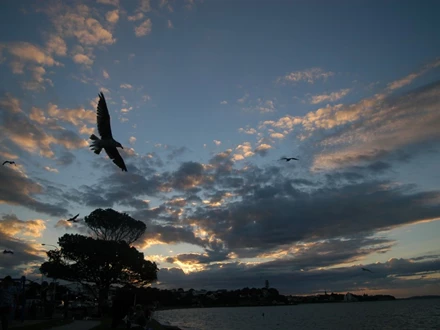The latest report from The Intergovernmental Panel on Climate Change (IPCC) came last week. Hundreds of the world’s top scientists spelled out how human influence has warmed the atmosphere, ocean and land. Widespread and rapid changes have occurred, the like of which have not been seen for many centuries or many thousands of years.
It’s tempting to think the lockdown was nature’s way of giving us time to think about what we’ve done, and are doing. But of course, for many this comes with many more things to think about.
We know that Covid-19 and climate change are symptoms of the same disease. They are brought on by humanity’s disruption of the planet’s natural processes. Emergency measures are being taken to deal with the pandemic. The sirens are blaring on climate change, and large parts of the world are actually on fire. But the response still lacks urgency.
Recently Rod Oram has reported how many big corporates, including Australian-owned Westpac, are only reporting a tiny portion of their greenhouse gas emissions, and even previous lead players like Z are falling behind in their carbon-busting ambitions. Much of the corporate world is still steaming towards the catastrophe of a world at least two degrees warmer than now.
Even this emergency risks obscuring the real threat. We are undermining all life on Earth. According to WWF average populations of vertebrate species on Earth have dropped by around two thirds since 1970. This is not about there being fewer Giant Pandas. This is the breakdown of the Earth's living systems. Imagine if two thirds of your body had been removed, or replaced with ill-fitting artificial parts? Would you be healthy? How long before you would break down completely?
We must move faster on climate change. Otherwise future ecological disruptions will make the pandemic look like plain sailing. We must rapidly rebalance our place in nature. Otherwise even dealing with climate change will pale into insignificance.
The good news is that we can do this, especially in New Zealand. We have abundant renewable energy, including the renewable energy of the people themselves. We have lots of surviving natural beauty. In the pandemic we’ve demonstrated that we can leverage these advantages to be a global leader.
We must make this our national obsession. The first step is the plan. We have the recently released Advice from the New Zealand Climate Change Commission. We must implement it. This will make profound changes to our economy and way of life in the next few years. It means better agriculture, with less fertilisers, rejuvenated soils and cleaner waterways. We will be planting huge numbers of trees, both plantations and native bush. We will be rejuvenating local communities, with new local jobs and new local enterprises, all based on restoring nature.
The Sustainable Business Network is already at work on this. With the Government’s Jobs for Nature Fund, we have employed more than 100 people in nature regeneration nationwide. We're working to restore the Hauraki Gulf. Our Climate Action Toolbox is helping hundreds of SMEs to track and reduce their greenhouse gas emissions. Our work on rethinking the way New Zealand uses plastic will keep plastic waste out of our oceans.
Businesses like Alsco, The Body Shop, BNZ, Meridian, New Zealand King Salmon and Foodstuffs are supporting these initiatives. And 5% of every SBN Investor’s annual fee to be part of our network goes straight to our work restoring waterways. To us that’s more than 500 organisations willing to move on the real issue – regenerating nature.
Together, we have big plans. Action on greenhouse gas emissions is rapidly becoming a normal feature of doing business. Action on biodiversity must be approached in the same way. And all the work we do must be linked to the well-being of all our communities, and all our people.
To genuinely be a ‘way of life’ our way of life must be harmonised with the health of the living systems of our planet.
That’s not mysterious, mystical, or even complicated. Just go outside.
You will hear the call.

